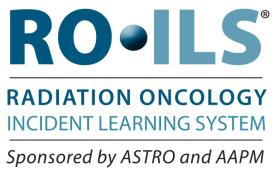
Patient Safety Conversation Hour Credit Evaluation
This is a one-hour interactive forum about patient safety. During this virtual conversation hour, attendees will review and discuss actual safety events in a small group lead by a designated facilitator. All the attendees will then convene in a large group to debrief with safety experts. The events are curated from the RO-ILS: Radiation Oncology Incident Learning System® database. RO-ILS is a national patient safety data repository housed within the auspices of a federally listed patient safety organization. The mission of RO-ILS is to facilitate safer and higher quality care in radiation oncology by providing a mechanism for shared learning in a secure and non-punitive environment. By collecting errors that occur at a local level, RO-ILS can aggregate data, identify national trends, and shed light on error pathways requiring intervention.
Target Audience
This activity is designed to meet the interests of radiation oncologists, radiation physicists, radiation dosimetrists, radiation therapists, nurses, and radiation oncology residents.
Learning Objectives
Upon completion of this live activity, participants should be able to:
- Demonstrate the importance of team-based error investigation.
- Apply principles of root cause analysis and incident learning recommendations to local errors.
- Assess local simulation/treatment planning/delivery processes, identify gaps and areas for improvement, and brainstorm mitigation strategies.
- Jeffrey Olsen, MD
- Employed by the University of Colorado.
- Receives compensation as a NAMSA Advisory Board member.
- Receives honoraria as an ASTRO Radiation Oncology Healthcare Advisory Council (RO-HAC) member.
- Serves as an ASTRO Guidelines Committee member.
- Served as an International Journal of Radiation Oncology · Biology · Physics Section Editor (relationship ended 12/31/2023).
- Bill Salter, PhD
- Employed by the University of Utah Huntsman Cancer Institute.
- Receives honoraria for work with Clarity PSO on the ASTRO Radiation Oncology Healthcare Advisory Council (RO-HAC).
- Receives honoraria as a Radiation Oncologist & Physicist Advisory Committee member from Mevion Medical Systems.
- Receives research funding as a Principal Investigator from RaySearch Labs, Elekta Clarit, and the University of Utah.
- Serves as a FLASH Alliance Committee member for Mevion Medical Systems.
- Serves on the ASTRO RO-HAC Leadership Council and as RO-HAC liaison on the ASTRO Clinical Affairs and Quality Council, CAQC Steering Committee.
- Serves as an American College of Radiology Economic Committee member.
- Serves as the University of Utah Computational Oncology Research Initiative Committee co-leader.
- Serves as an Intelligent Imaging Consortium member for Varian, a Siemens Healthineers company.
- Serves as a member of the American Association of Physicists in Medicine Work Group on IMRT and VMAT and Task Group No. 288 - Consensus Recommendations - for Incident Narrative Formatting.
The American Society for Radiation Oncology (ASTRO) is accredited by the Accreditation Council of Continuing Medical Education to provide continuing education to physicians.
ASTRO is awarded Deemed Status by the American Board of Radiology to provide SA-CME as part of Part II Maintenance of Certification.
Available Credit
- 1.00 AMA PRA Category 1 Credit™
The American Society for Radiation Oncology (ASTRO) is accredited by the Accreditation Council for Continuing Medical Education for physicians. ASTRO designates this for a maximum of 1.00 AMA PRA Category 1 Credit™. Physicians should claim only the credit commensurate with the extent of their participation in the activity.
- 1.00 Certificate of AttendanceThis activity was designated for 1.00 AMA PRA Category 1 Credit™.
Price
To be eligible to receive continuing medical education credit, attendees must complete the online evaluation by Sunday, June 30, 2024. Physicians should claim only the credit commensurate with the extent of their participation in the activity.
Required Hardware/software
One of the two latest versions of Google Chrome, Mozilla Firefox, Internet Explorer or Safari.

 Facebook
Facebook X
X LinkedIn
LinkedIn Forward
Forward